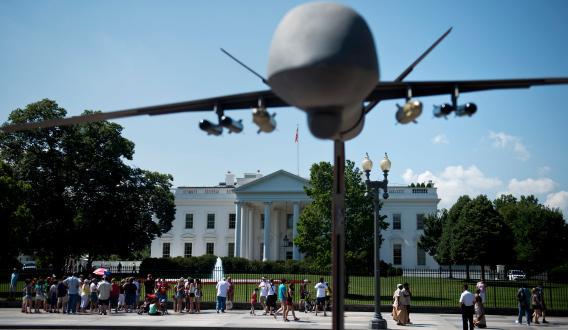Under pressure from lawmakers who hold in their hands the fate of several of his nominees, President Obama has agreed to provide a pair of intelligence committees access to a secret memo on the targeted killings of American terrorism suspects overseas.
The Washington Post with a refresher course for those who need it:
The memo, written by the Justice Department’s Office of Legal Counsel, provided the administration’s legal basis for a 2011 CIA drone attack in Yemen that killed U.S.-born cleric Anwar al-Awlaki. Obama described Awlaki as the chief of “external operations” for al-Qaeda in the Arabian Peninsula, the al-Qaeda affiliate held responsible for several unsuccessful attacks on the United States.
The administration had described the memo as an internal “work product” that does not have to be shared with Congress. Lawmakers accused the administration of a lack of transparency and likened its handling of the issue to the refusal of the George W. Bush administration to provide access to legal memos justifying the use of harsh interrogation methods against terrorism suspects. Obama publicly released those memos shortly after taking office in 2009.
The move comes only days after NBC News got its hands on an unclassified white paper dealing with the same topic. That unsigned document was a summary of the classified memo in question. While the legal analysis it laid out is believed to closely track the rationale laid out in the actual memo, it left lawmakers—and the press—wanting more.
The summary itself didn’t discuss any specific target and steers well clear of the specifics needed to evaluate what, exactly, is the threshold of evidence required to make a final decision on when it is legal to kill an American. The portions of the document that raised the most questions and concerns were the vague sounding classification of “an associated force,” and the rather elastic definition of an “imminent” threat. The former would appear to give the government broad leeway to target anyone they deem even remotely connected to al-Qaida, while the latter gives the government the go-ahead to target a suspect even when the officials, in the words of the memo, have no “clear evidence that a specific attack on U.S. persons and interests will take place in the immediate future.” The document, likewise, sheds little light on who makes the final decision, saying only that such determinations can be made by an “informed, high-level official of the U.S. government.”
The release of the memo comes after a bipartisan group of senators threatened to delay, and perhaps even block, the confirmation of Obama’s picks to lead the CIA and the Pentagon if they didn’t get a look at the full memo. The drone war in general , and the legal rational behind it in specific, are expected to be major topics during today’s confirmation of CIA nominee John Brennan.
